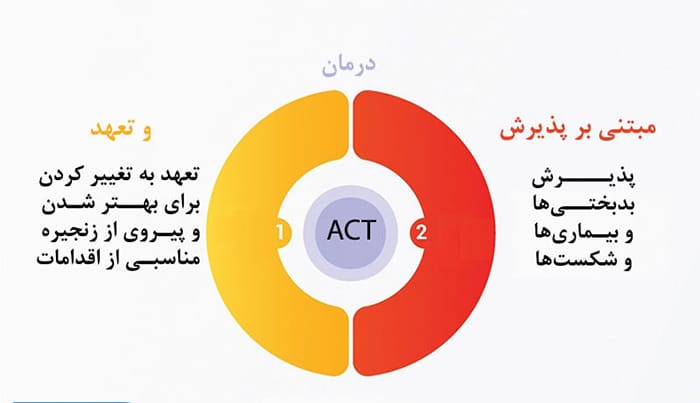Acceptance and Commitment Therapy (ACT) is a therapeutic approach in the history of cognitive behavioral therapy that uses mindfulness approaches to improve mental status. This approach is based on the principle that human suffering arises from unfounded attempts to control or avoid negative experiences.
The acceptance and commitment approach suggests that fully accepting these negative experiences and committing to personal values can make life more satisfying. The goal of this approach is to distance oneself from them by taking a useful look at one’s thoughts, instead of fighting and tolerating them. In this type of treatment, focusing on the present and communicating with individual values is of great importance.
Acceptance and commitment approach therapy helps us to find resilience to life’s challenges and improve our quality of life. The main goal of this type of therapy is to promote acceptance of thoughts, feelings and experiences.
This approach is a new method that focuses on finding our difficult experiences and emotions as part of the normal functioning of the brain. This approach helps us stop fighting ourselves ACT admits that life is not easy and it never will be. This approach also states that we are able to choose to experience rich and meaningful lives through committed values and actions.
According to the definition of the Association of Behavioral Sciences, ACT is a unique experience-based psychological intervention that uses acceptance and mindfulness strategies, along with commitment and behavior change strategies to increase psychological flexibility. Psychological flexibility means the ability to be more fully in touch with the present moment as a conscious human being and the ability to change or persist when doing so serves worthwhile goals.
History of Acceptance and Commitment Approach
In the 1980s, Steven C. Hayes, a professor of psychology at the University of Nevada introduced the innovative acceptance and commitment approach ACT. As an advanced therapeutic approach, it relies on the principles of behaviorism and a philosophy called “attention-oriented realism philosophy”. The main goal of this approach is to strengthen character, increase awareness, and promote commitment by focusing on acceptance and commitment to personal values.
Hayes disagreed that suffering should be avoided; He considered suffering an inevitable and necessary part of being human. He emphasized that running away from any problem only increases the distance from the solution. The easiest way to escape from a problem is to solve it. Since ACT is a new and well-known therapeutic approach, it has been able to gain a lot of fame and recognition by referring to current psychological theories that have been effective and useful in the field of psychotherapy.
Suggested article: emotion-oriented approach

The importance and position of the approach based on acceptance and commitment
In this section, we will give a detailed interpretation of the importance and place of the approach based on acceptance and commitment and address the six main skills that form the foundations of the approach based on acceptance and commitment.
Understanding the present moment
In this component, the emphasis on paying attention to the present is discussed. By focusing on this precise point in time, people are able to relate to the realities of that moment without applying judgment or incompatible interference. This ability to understand and recognize the current situation is an opportunity to create a deep awareness of oneself and the surrounding environment, which emphasizes the importance of communicating with current feelings and thoughts. Through this process, people can experience clarity and awareness in the present and establish a deeper connection with themselves and others.
separation
Separation is very important. In this component, defusion means separating thoughts and feelings from one’s identity. By addressing this concept, people are able to prevent excessive analysis or harmful identification by reducing the level of thought measurement and conscious creation. This action helps them to relate to current realities in a healthier way and perceive their feelings and thoughts with awareness.

acceptance
Acceptance means accepting the existence of negative and unpleasant feelings and experiences, without trying to change or eliminate them. This component emphasizes the idea of focusing on communication and awareness of present experiences. In other words, acceptance deals with valuing all of one’s present experiences, including uncomfortable feelings and negative thoughts, without trying to change or escape from them. This process helps people to connect with their feelings and experiences and at the same time not prevent them so that they can progress towards their goals and values in life. The concept of acceptance in the ACT model is based on focusing on awareness of present experiences and accepting uncomfortable feelings and experiences without trying to change them. This component helps people to have a meaningful relationship with their experiences and instead of running away or hiding them, plan and advance their goals and values in life. With an approach based on acceptance and commitment, a person is placed on a path forward towards personal growth and improvement of his life.
Self as context
In this section, the self is considered as a core context or connection between one’s thoughts, feelings, and experiences. This self-view helps a person not to worry about remembering the past or the future and to gain more awareness in the present. This component emphasizes the importance of observing and understanding oneself as a source and main foundation for transformation. And personal growth encourages people to examine and understand themselves more deeply in order to establish healthier relationships with themselves and others. The importance of this component can be attributed to establishing healthy relationships with oneself and others, improving self-awareness and increasing knowledge about Self and experiences mentioned.
Suggested article: Introduction to psychoanalysis
values
Values are one of the most important and key parts of the approach based on acceptance and commitment. This aspect of ACT emphasizes the importance of taking sustainable and purposeful actions that are consistent with personal values.
By knowing their values and adapting to them, people can make better decisions that lead to personal growth, happiness and a sense of satisfaction in life. Values can act as a life guide and work towards the realization of personal goals and ideals. This part of ACT addresses the view that meaningful and sustainable lives can only happen when people make decisions based on their personal values and take actions that are consistent with these values. In fact, values In ACT, they play an essential role in directing people’s lives and guiding them in the direction they believe they should go. These choices and actions according to personal values lead life with meaning and purpose and help in personal growth and life satisfaction.

Committed actions
In ACT, committed performance is seen as an essential tool for achieving balance and satisfaction in life. Committed performance emphasizes that a person’s actions must be compatible with his values, goals and ideals, and through committed and purposeful actions, he can create a meaningful and fruitful life and move past his former patterns towards improvement and transformation. Committed performance, a person strengthens his power for positive changes in his life and acts as an active and responsible factor in improving the quality of his life. This component is of great importance for the realization of satisfaction, meaning and personal success in the framework of the ACT therapeutic process.
Although Acceptance and Commitment Therapy (ACT) is effective, it is not suitable for all problems in different areas.
Although the ACT approach emphasizes that past experiences can affect people’s current mental state, it focuses more on the solutions that people can do in the present. For people with deep trauma, ACT may not be comprehensive enough to meet their needs. In this case, therapies that focus more on the roots of maladaptive thinking and behavior patterns may be a more appropriate option.

